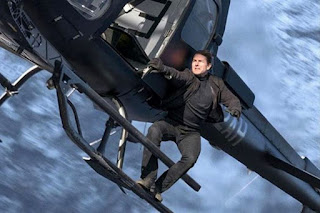"Joker"
Joker, the disturbing origin story of the character from director (and co-writer) Todd Phillips and actor Joaquin Phoenix, is the bleakest of comedies. Late in the film, Arthur Fleck, who will become Joker, says that he has long thought his life is tragedy only to realize it is a comedy. But his life, and the film, are comedies only in the sense that the Joker sees the word -- one daring everyone else to admit that they don't get the joke.
That Phoenix is brilliant cannot be argued, and with an impressive resume already he may become the second actor to win an Oscar playing the best known of the Batman villains. But the movie overall, as watchable as it may be, is a too-familiar consideration of the connection between private madness and public heroism, of the rage of the disenfranchised against the unfeeling elite, of Bernhard Goetz, of the themes evident in Martin Scorsese's Taxi Driver and King of Comedy. It's no accident that Robert De Niro plays a talk-show host in Joker, since he also starred in those two Scorsese films.
Fleck, the central character, is a would-be comedian who survives by working as a street clown, the sort that stands outside businesses to catch the eye of possible customers. His personal life consists of caring for his ailing mother. Both professionally and personally he endures regular humiliation until, in a moment made up equally of a good deed and a bad impulse, he opens up his interior furies through a violent act. That act is misinterpreted by many, unleashing other furies as well as Arthur's own, and setting him opposite Thomas Wayne, the businessman father of a very young Bruce Wayne. Illusions and delusions follow, startling revelations and burning streets, and finally madness -- though the film suggests that Joker is hardly the only madman, and far from the most dangerous one.
Presented along grimy cityscapes that recall the urban blight of Taxi Driver, Joker is at once a look back and a pondering of the angry present, of how many people feel ignored and downtrodden, or sneered at by the world's Thomas Waynes. This is all well made but where does it take us, especially as we become more aware of Arthur's madness and uncertain about how clearly he sees the world? Its violence, though much debated even before the movie opened, is not that different from other films (and our murderous modern day). The closing scene is, much like one of the print Joker stories, a killing joke; the uneasy laughter it demands is more likely to generate a shrug or a yawn.
That Phoenix is brilliant cannot be argued, and with an impressive resume already he may become the second actor to win an Oscar playing the best known of the Batman villains. But the movie overall, as watchable as it may be, is a too-familiar consideration of the connection between private madness and public heroism, of the rage of the disenfranchised against the unfeeling elite, of Bernhard Goetz, of the themes evident in Martin Scorsese's Taxi Driver and King of Comedy. It's no accident that Robert De Niro plays a talk-show host in Joker, since he also starred in those two Scorsese films.
Fleck, the central character, is a would-be comedian who survives by working as a street clown, the sort that stands outside businesses to catch the eye of possible customers. His personal life consists of caring for his ailing mother. Both professionally and personally he endures regular humiliation until, in a moment made up equally of a good deed and a bad impulse, he opens up his interior furies through a violent act. That act is misinterpreted by many, unleashing other furies as well as Arthur's own, and setting him opposite Thomas Wayne, the businessman father of a very young Bruce Wayne. Illusions and delusions follow, startling revelations and burning streets, and finally madness -- though the film suggests that Joker is hardly the only madman, and far from the most dangerous one.
Presented along grimy cityscapes that recall the urban blight of Taxi Driver, Joker is at once a look back and a pondering of the angry present, of how many people feel ignored and downtrodden, or sneered at by the world's Thomas Waynes. This is all well made but where does it take us, especially as we become more aware of Arthur's madness and uncertain about how clearly he sees the world? Its violence, though much debated even before the movie opened, is not that different from other films (and our murderous modern day). The closing scene is, much like one of the print Joker stories, a killing joke; the uneasy laughter it demands is more likely to generate a shrug or a yawn.



Comments
Post a Comment